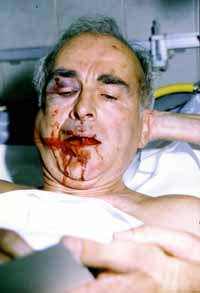Joseph
Sobran |
 April 8, 2001 Free Speech: Shot Down in Beirut Joseph Sobran THE Institute for Historical Review is the intellectual organ of Holocaust revisionism or, as its enemies call it, Holocaust "denial." It produces a scholarly bi-monthly magazine, The Journal of Historical Review, which deals not only with the Holocaust but with a range of other historical topics. It runs long and fascinating articles on such subjects as Lincoln's real views about race.
The IHR holds conferences featuring speakers who challenge conventional liberal history. One favorite is the brilliant, controversial British historian David Irving. Other recent speakers include the historian John Toland, the former congressman Pete McCloskey, and the journalist John Sack. Sack, himself Jewish, wrote a semi-complimentary article on the IHR for Esquire, expressing his surprise that the revisionists were "affable, open-minded, intelligent, intellectual. Their eyes weren't fires of unapproachable certitude and their lips weren't lemon twists of astringent hate. Nazis and neo-Nazis they didn't seem to be. Nor did they seem anti-Semites." Sack also acknowledged that the revisionists have poked holes in the official Holocaust story and forced the accredited experts to discard some of the myths, though not, of course, the chief point of contention: whether Nazi Germany deliberately exterminated six million Jews. (Most revisionists think fewer than a million Jews perished of various causes -- chiefly disease - - during World War II.) This year the IHR decided to co-sponsor a conference in Beirut. But just before it was to begin in late March, when all preparations had been made and the attendees had bought plane tickets and reserved hotel rooms, the Lebanese government suddenly banned the meeting. The Lebanese reportedly did this under American pressure, and the United States Government, it is not far-fetched to suspect, had in turn been pressured by the usual suspects: Jewish-Zionist organizations. So the U.S. Government acted, underhandedly, to ban a meeting that would have been entirely legal and constitutionally protected in the U.S. Ah, the Land of the Free, spreading the blessings of liberty around the world! But it isn't just our own government that is, as one Israeli journalist has put it, "in our hands." As Sack notes, Holocaust revisionism is now an imprisonable offense in (and beyond) most of what used to be called Christendom: "in Germany,... Holland, Belgium, France, Spain, Switzerland, Austria, Poland, and Israel, where denying the Holocaust can get you five years, while denying God can get you just one." (Maybe they should inscribe "In the Holocaust we trust" on the shekel.) Irving has been fined $18,000 in Germany for arguing that an Auschwitz cyanide chamber was a mere replica. He was correct, but he had to pay anyway. (Irving is now denied access to many of the German wartime documents he himself discovered!) The Holocaust controversy is so bitter that it can't even be called a debate. One side refuses to debate, denying that there is anything to debate, rather like the Shakespeare "experts" who insist that there is absolutely, positively no room for doubt that a modestly educated man could write Hamlet. But I will say this for the Shakespeare scholars with whom I've tangled: they've never tried to beat me up, throw me in jail, or ruin my livelihood. But what are we to think of people who uphold their position with violence, repression, smears, ostracism, and intimidation, while professing to believe that there are no rational grounds for disagreeing with them? Do they -- can they -- really believe in their own position? If so, why not appeal to sweet reason, rather than fear? They behave as if they think that position is so fragile that doubts about it must be immediately squelched by any means, lest those doubts become a fiery contagion.
I've stayed aloof from the Holocaust controversy; I always tune out when people get into the fine points of how gas chambers are constructed. But I do know that telling the truth is hard work, because even speaking precisely takes a special mental effort. Reconstructing the past is even harder work. You need a long time to acquaint yourself with the evidence. Then you have to learn to evaluate it, sorting out the reliable, the central, the trivial, the misleading. Then you also have to learn to set aside the assumptions and prejudices you didn't realize were shaping and coloring your mind while you were gathering evidence in the first place. Finally you may wind up possessing a precious fragment of the truth, along with the rueful recognition of how much you still don't know. The whole process involves a lot more quiet reflection than shouting. Freedom of speech means much more than legal protection, though that is a necessary condition. It ultimately means an atmosphere hospitable to calm reason. Obviously, something disastrous happened to the Jews
during World War II; even the revisionists don't deny that.
But does the word "Holocaust" accurately sum up the Jewish
misfortune? Maybe so; maybe the secular Jewish-Zionist thugs
and pressure groups are essentially right. But that's a
conclusion I'd want to reach as a free man, not because a
different conclusion might result in my kneecaps being
broken. And in this controversy, I know which side is
appealing to my mind, and which is going for my kneecaps.
--------------- Joseph Sobran is a nationally-syndicated columnist, lecturer, and author. For 21 years he wrote for National Review magazine, including 18 years as a senior editor. He is now editor of the monthly newsletter Sobran's (P.O. Box 1383, Vienna, VA 22183). This essay is from his "Washington Watch" column in the April 5, 2001, issue of The Wanderer (201 Ohio St., St. Paul, MN 55107), a traditionalist Roman Catholic weekly. |
 Charges
that the IHR is anti-Semitic and pro-Nazi are belied by the
Journal's calm and reasonable tone, in contrast to the
shrillness and violence of its enemies. And I do mean
enemies, not merely critics. A few years ago arsonists
destroyed the IHR's offices and warehouse. Leading
revisionists such as Robert Faurisson have been
attacked (right) in the streets and severely beaten by
Jewish thugs. Jewish groups, especially Zionist
organizations, are forever reviling the IHR and trying to
interfere with its activities. They often succeed, and they
have just scored another victory -- not only over the IHR,
but over free speech itself.
Charges
that the IHR is anti-Semitic and pro-Nazi are belied by the
Journal's calm and reasonable tone, in contrast to the
shrillness and violence of its enemies. And I do mean
enemies, not merely critics. A few years ago arsonists
destroyed the IHR's offices and warehouse. Leading
revisionists such as Robert Faurisson have been
attacked (right) in the streets and severely beaten by
Jewish thugs. Jewish groups, especially Zionist
organizations, are forever reviling the IHR and trying to
interfere with its activities. They often succeed, and they
have just scored another victory -- not only over the IHR,
but over free speech itself. Deborah
Lipstadt, the scourge of Holocaust revisionism who
defeated Irving in a sensational libel suit in England last
year, makes the extraordinary argument that as Holocaust
survivors die off, there will be more and more doubts that
the Holocaust ever occurred. Well, the last Civil War
veteran was planted quite a while ago, but nobody doubts
that the Civil War happened. Mrs. Lipstadt's notion that
history depends on living witnesses is startlingly naive,
especially considering how many Holocaust "witnesses" have
been discredited. (Don't worry: no government will put you
in prison for falsely claiming to have been a prisoner at
Auschwitz, even though that might seem to sow doubts about
the Holocaust.)
Deborah
Lipstadt, the scourge of Holocaust revisionism who
defeated Irving in a sensational libel suit in England last
year, makes the extraordinary argument that as Holocaust
survivors die off, there will be more and more doubts that
the Holocaust ever occurred. Well, the last Civil War
veteran was planted quite a while ago, but nobody doubts
that the Civil War happened. Mrs. Lipstadt's notion that
history depends on living witnesses is startlingly naive,
especially considering how many Holocaust "witnesses" have
been discredited. (Don't worry: no government will put you
in prison for falsely claiming to have been a prisoner at
Auschwitz, even though that might seem to sow doubts about
the Holocaust.)